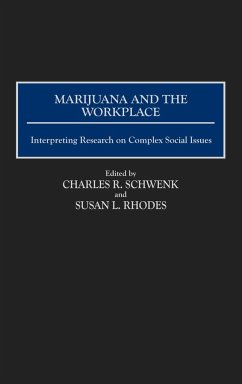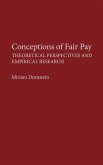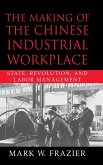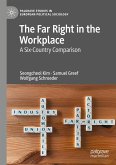If sound policy is to be made on the issue of marijuana in the workplace, all available empirical evidence about its impact on job performance should be utilized in the decision process. Although a substantial amount of relevant research has been done, the results published in journals in widely divergent fields, are not easily summarized and present no single, simple message for decision makers. Schwenk and Rhodes offer a unique review of this complex body of work and challenge the many highly publicized but scientifically unsound mythical numbers touted as supporting various policy options. The authors provide a clear and objective presentation to managers on how to evaluate the evidence for themselves and make sound decisions for their own organizations. Scrupulously unbiased in its choice of material, the book will be an essential resource for organizational and public policy makers, and for university students and their teachers. The effect of marijuana on job performance has been widely accepted as harmful-but is it? Congress thought so, and in 1988, used productivity losses which it attributed to marijuana and other drugs to justify passage of legislation initiating a mandate for a drug-free workplace. Additional legislation expanding this mandate followed and a high percentage of large corporations and an increasing number of small businesses now expend scarce resources on anti-drug programs. Schwenk and Rhodes remain neutral in the debate over workplace drug policies, but argue that policy should be informed by empirical research on the impact of marijuana on job performance. Their book is both a challenge to the mythical numbers so often publicized as supporting a particular advocate's vested position, and a guide to both practitioners and scholars to help them evaluate the diverse body of existing evidence and the claims made by those committed to given policy positions. Schwenk and Rhodes reprint examples of high quality research previously published in major journals in the fields of psychology, anthropology, economics and medicine. Reviewing and summarizing existing findings, the authors relate these findings to the decision situations faced by policy-makers in the private and public sectors. While the book refuses to endorse any decision outcome with regard to marijuana and the workplace, it makes strong recommendations about the ^Iprocesses^R that should be used in selecting those outcomes. It provides guidelines for evaluating policy-relevant social scientific evidence and discusses the role such evidence can and should play in policy-making. The book shows that contrary to widely held beliefs, very little evidence that the substance has a consistent negative effect on worker productivity. Though social science does not show that resources devoted to creating a drug-free workplace are likely to pay off economically, the authors stress that the implications of this fact for corporate and government decisions are not cut and dried, but depend on the decision rules and the policy goals selected by policy-makers. This book will be an essential tool for managers, scholars, and anyone trying to make sense of the complicated and confusing maze of data and arguments surrounding this divisive issue.








